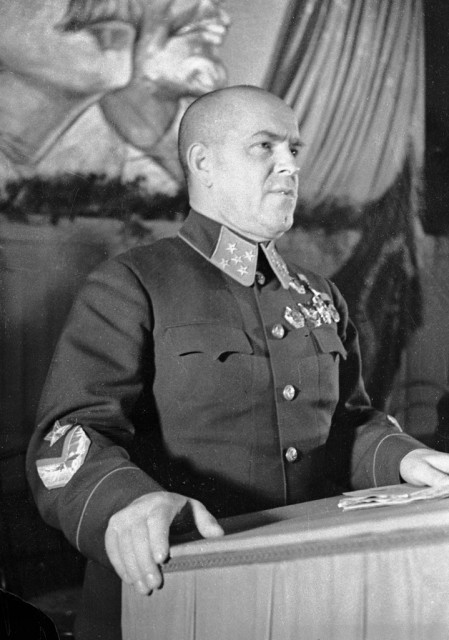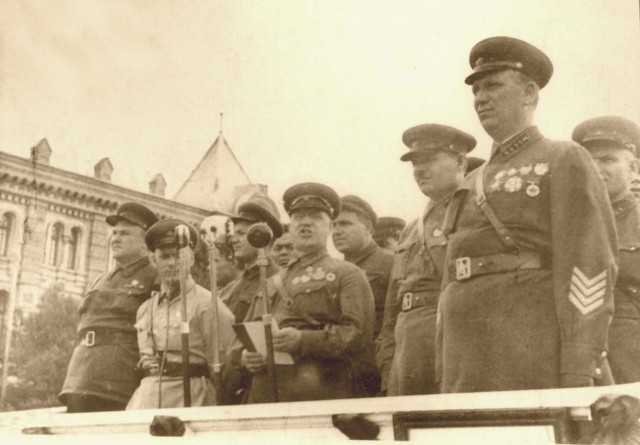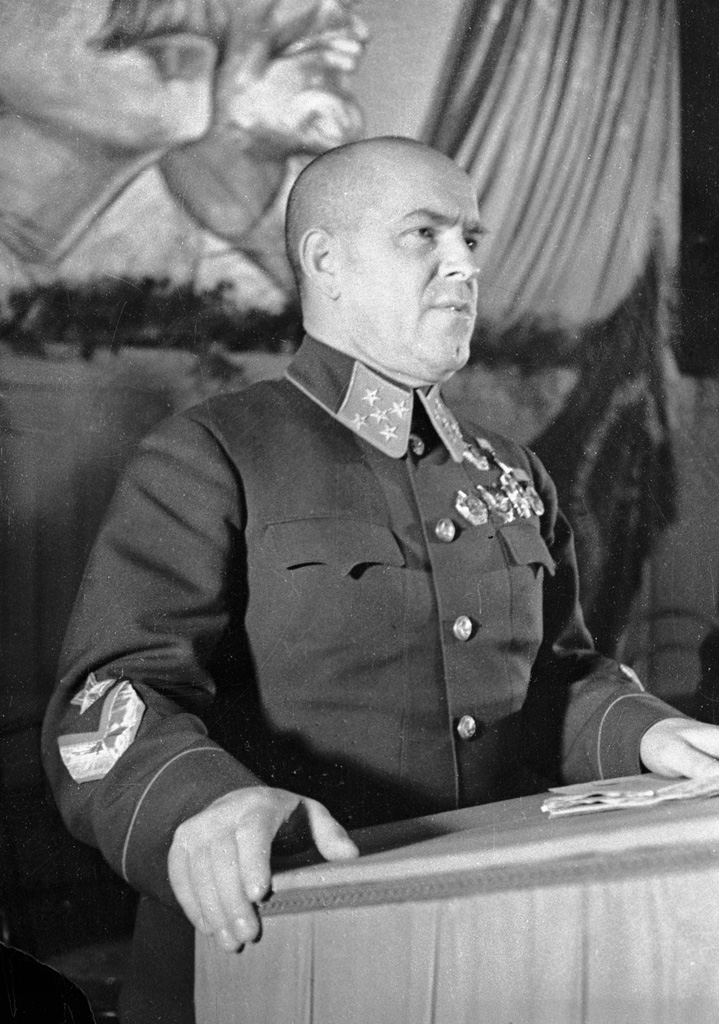
Russia is known for its harsh way of life. Between its brutal winters and its dictatorial demand for perfection and excellence in its citizens, it has become known as one of the toughest countries on Earth in which to live. So Russia’s people have evolved in ways that allow them to survive the harsh lifestyle, and few have ever excelled in Communist Russia as well as Georgy Zhukov.
When we in the West think of the great WWII generals we automatically think of Edwin Rommel, George Patton, Dwight D. Eisenhower and Douglas McArthur. Yet these men, while geniuses in their own right and good, hearty warriors, were not nearly as determined and relentless as Zhukov. He orchestrated the defense of the Russian Eastern Front in such a way that the force of Nazi military might was ground down and fractured, allowing for the Western Front to be breached and the American, British, and French troops to stream into a weakened German state.
Living in Moscow when WWI broke out, Zhukov was drafted into the Russian army as a cavalryman. When the Revolution came he jumped on board with the Bolsheviks, becoming a proud member of the Communist Party. He was a dedicated soldier who barely escaped Joseph Stalin’s purges that were meant to wipe out the military officer corps. Few would realize it at the time, but this escape would prove to be the salvation of the Soviet Union.
In 1901, the Japanese had humiliated the Russian military during the Japanese-Ruso War, and in the summer of 1939, the two powers came to blows again, this time in Manchuria. The Japanese outnumbered the Russian forces; by the time Zhukov arrived in the area, there had already been a couple of pitched battles. As soon as he arrived, he created one of the most coordinated battle-plans of this stage of WWII, and easily routed the Japanese despite their having the larger force. What is surprising is that despite the massive offensive, Zhukov had been able to keep the Japanese completely in the dark as to his intentions. This battle would have long-lasting consequences, for Tokyo was forced to turn to the Pacific for oil and this eventually lead them into conflict with the United States.
During Operation Barbarossa in June of 1941 the Germans poured into the Russian countryside and defeated every force thrown at them. However, in the Battle of Yel’nya, near Smolensk, Zhukov stood his ground and delivered a hefty blow to the Nazi advance. This had so far been the only Russian success in this crucial early stage of the conflict.

Zhukov’s successes forced a reluctant Stalin to rely upon his expertise, and suddenly Zhukov found himself running all over the shattered Russian lines, shoring up their defenses and stemming the enemy tide. Wherever the Germans hit hardest, Zhukov was there like a specter of Death, and he not only blunted every attack but, in the wintertime battle around Moscow, he launched a lethal counter offensive. It was Zhukov that held the city of Stalingrad during 1942-43, and there is little doubt that had he not been there the city would have been taken by the Germans in that most famous battle.
Zhukov was tasked with driving the Germans out of Russia, and in the summer of 1943 he destroyed the last remnants of Nazi eastern offensive power at Kursk. Then, in 1944, following up on his success at Kursk, he launched Operation Bagration which knocked Finland (a German ally) out of the war and out of the Baltic States. He drove his Russian armies into Germany and captured Berlin.
While such men as Konev and Rokossovsky were first-rate commanders, few held the overall strategic command and thinking abilities of Georgy Zhukov. This was witnessed when Zhukov rode into Berlin and accepted the surrender. He was also the main attraction at the Victory Parade in Red Square, the Forbes reports.
Yet despite the prominent career of this ardent warrior, Zhukov was plagued by his very own success compared to a man like Eisenhower. Eisenhower could achieve the presidency because the political framework of the United States would never afford power to a dictator. With Zhukov, he had no such chance. Stalin demoted him, afraid his popularity would make Zhukov a threat to his power. Ironically, that very popularity saved Zhukov from the executioners block.
He would again rise up through the ranks when a comrade of his, Nikita Khrushchev, took power and made Zhukov Minister of Defense. The war hero actually wanted to downsize the military and allow for both Russia and the United States to be able to spy on each other in order to keep an equilibrium. Yet, this policy would cause him to be removed from public office and threatened with arrest, due to his apparent contempt for the government. His entire career and deeds were all but expunged from official records.
Few books have even been written about this man, who has been called “the most well-rounded WWII general”. Yet some have done a good amount of research on the man, like Geoffrey Roberts, who hopes to give Zhukov his day in the spotlight of military history. Without Zhukov, how might the world be different?
